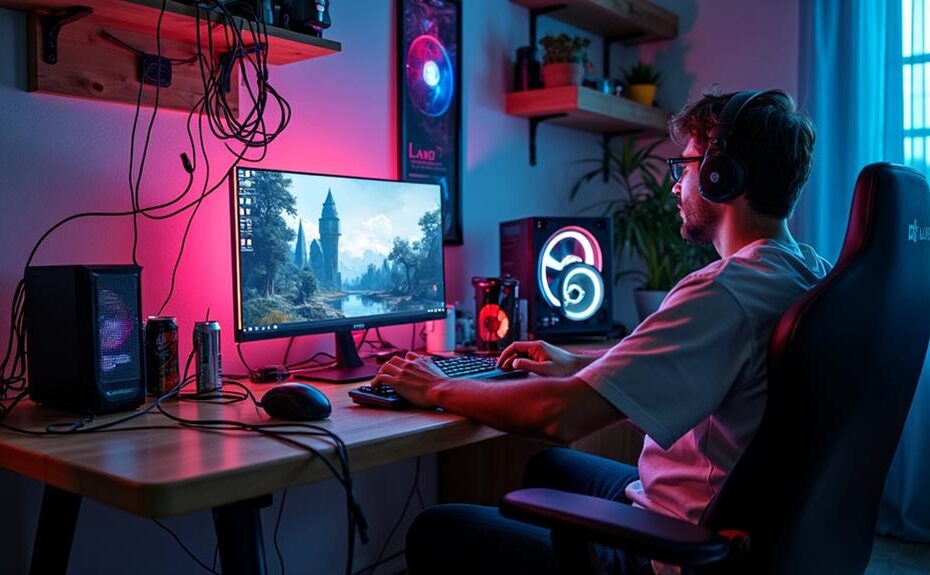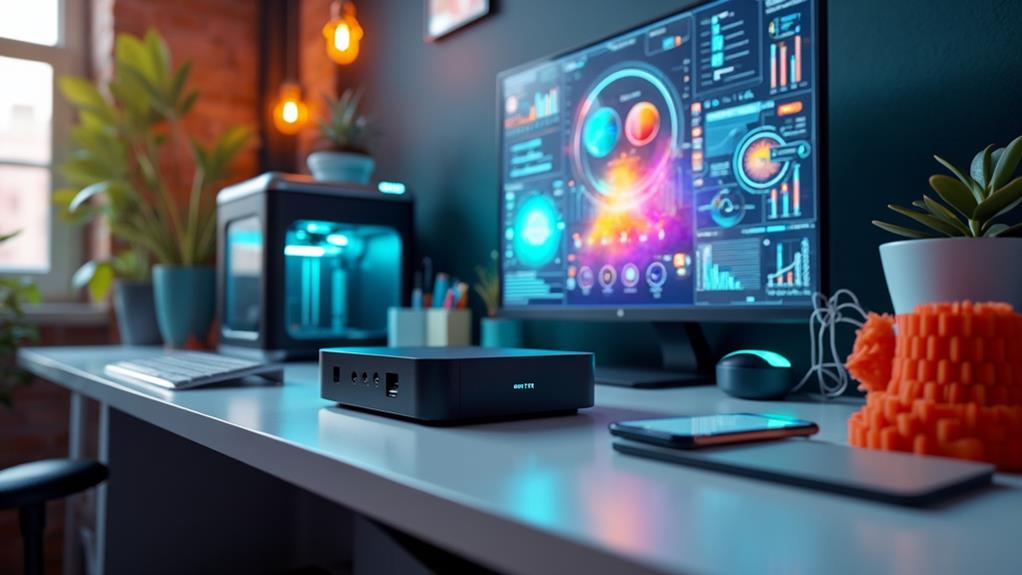



Using a mini PC for gaming can come with several drawbacks that you should be aware of. Performance limitations are common, as many rely on integrated graphics that can't handle modern games well. Thermal management issues often lead to overheating, causing throttling during intense gameplay. Upgradeability is another concern; components like CPUs and GPUs are usually soldered, making upgrades nearly impossible. Plus, the limited connectivity options can restrict your gaming peripherals. If you want to avoid these pitfalls, you'll find that further exploration of alternatives could enhance your gaming setup greatly.
Key Takeaways
- Integrated graphics in Mini PCs limit gaming performance, especially for modern AAA titles that demand dedicated GPUs.
- Compact designs restrict cooling options, leading to overheating and thermal throttling during intense gaming sessions.
- Upgradeability is often limited, with many components soldered in place and capped RAM at 32GB or less.
- Connectivity challenges arise from a limited number of USB ports and lack of support for multi-monitor setups.
- Lower-powered CPUs may struggle with high processing demands, affecting overall gaming performance and multitasking capabilities.
Performance Limitations
When it comes to gaming, performance limitations of Mini PCs can be a significant drawback. These compact systems often rely on integrated graphics, which can severely restrict your gaming performance compared to setups with dedicated GPUs. For instance, while the ACEMAGIC Mini Gaming PC boasts an Intel Core i9-11900H processor, its compact design may still face challenges with limited connectivity options, making it difficult to connect multiple high-performance peripherals. You might find it challenging to achieve high-quality graphics and smooth frame rates, especially in demanding games.
Moreover, Mini PCs frequently feature lower-powered CPUs that struggle to deliver the high processing power required for peak gameplay. This limitation can be particularly frustrating during intense gaming sessions, where every frame counts. As you push the system further, overheating issues may arise, leading to throttling and further reductions in performance.
Adding to the woes, Mini PCs generally have limited upgradability. This means you may face difficulties in enhancing performance over time, often necessitating a whole new system to keep pace with evolving gaming demands. Additionally, with restricted RAM capacity—usually capped at 32GB—your multitasking abilities can suffer. Running multiple applications simultaneously can exacerbate performance limitations, making it clear that while Mini PCs offer portability, they may not be the best choice for serious gamers.
Thermal Management Issues
Many gamers quickly discover that thermal management issues can be a significant concern with Mini PCs. The compact design of these systems often limits space for effective cooling components, which can lead to overheating during prolonged gaming sessions. The MINISFORUM UN100D, for instance, showcases the need for efficient cooling solutions, as its powerful 12th Gen Alder Lake N100 processor and integrated Radeon 680M graphics require adequate thermal management to maintain performance. When you're diving into graphically intensive games, the restricted airflow becomes a critical factor. Many mini PCs rely on smaller fans that struggle to dissipate heat efficiently. As a result, you might notice increased noise levels as the system works harder to cool itself.
Furthermore, thermal throttling can kick in when temperatures rise too high, causing your performance to drop and potentially impacting your gaming experience. Some models utilize passive cooling systems that operate silently, but they often can't maintain ideal temperatures under heavy loads. This lack of adequate thermal management not only affects your gameplay but can also put additional stress on internal components over time. If you're considering a Mini PC for gaming, it's crucial to recognize these thermal management challenges and how they can influence your overall experience.
Upgradeability Constraints
While thermal management issues pose significant challenges for gaming performance in Mini PCs, upgradeability constraints add another layer of complexity. You'll find that many Mini PCs come with limited upgradeability due to their compact design. Key components like CPUs and GPUs are often soldered directly to the motherboard, making replacements or upgrades nearly impossible. This limitation is especially pronounced as power efficiency and cost effectiveness become increasingly important in gaming setups. If you're looking to boost your system's performance, you might be disappointed to discover that some models feature only one or two RAM slots, capping the maximum memory upgrade at 32GB or less. The small form factor can also restrict the inclusion of standard expansion slots, which means you can't install a dedicated graphics card or additional hardware easily.
Even storage upgrades can be a hassle, as many Mini PCs allow for only one internal drive or have limited SATA connections. Ultimately, these upgradeability constraints mean you may have to replace the entire Mini PC to keep pace with technological advancements, rather than simply upgrading individual components. If you're serious about gaming, it's crucial to weigh these limitations against your performance expectations.
Graphics Capabilities
The graphics capabilities of Mini PCs can often fall short for gamers looking to experience the latest titles at ideal settings. Many models rely on integrated graphics, which greatly limits performance and graphics quality, especially in modern AAA games. The compact design of Mini PCs restricts the inclusion of dedicated GPUs, leading to performance bottlenecks during graphically-intensive gaming sessions. This can leave you struggling to achieve higher resolutions and frame rates, making them less suitable for those who crave ultra settings.
Moreover, thermal constraints are a common issue. Mini PCs can overheat during prolonged gaming, causing the system to throttle graphics performance to maintain safe temperatures. This overheating can lead to frustrating dips in performance when you need it most. Additionally, the lack of upgradeability in many Mini PCs means you might not be able to enhance graphics capabilities as gaming demands evolve. Without the option to install high-end graphics cards, you're often left with a system that quickly becomes outdated. Ultimately, if you're serious about gaming, you may want to think twice before relying solely on a Mini PC for your gaming needs.
Connectivity Challenges
Connectivity challenges can greatly impact your gaming experience when using a Mini PC. While these compact machines offer an appealing size, their connectivity options often fall short compared to traditional desktops. You may find that the limited number of USB ports restricts your ability to connect multiple peripherals simultaneously, such as controllers, keyboards, and mice. This limitation can hinder your gameplay, especially in fast-paced scenarios where quick access to devices is essential.
Moreover, many Mini PCs lack support for multi-monitor setups, which can greatly enhance your gaming experience. With fewer display outputs, you might miss out on the immersive environments that multiple screens provide. The internal expansion options are also restricted, making it challenging to upgrade connectivity features like adding more USB ports or installing dedicated graphics cards.
Additionally, you might encounter networking limitations, as some Mini PCs don't support high-speed Ethernet or Wi-Fi 6. This can adversely affect your online gaming performance. Finally, the compact size often leads to thermal constraints, which could compromise connectivity stability during long gaming sessions, ultimately impacting your performance.
Disclosure: As an Amazon Associate, I earn from qualifying purchases.




